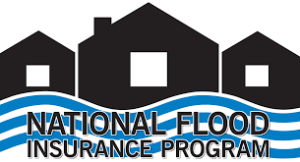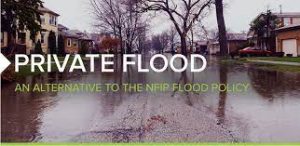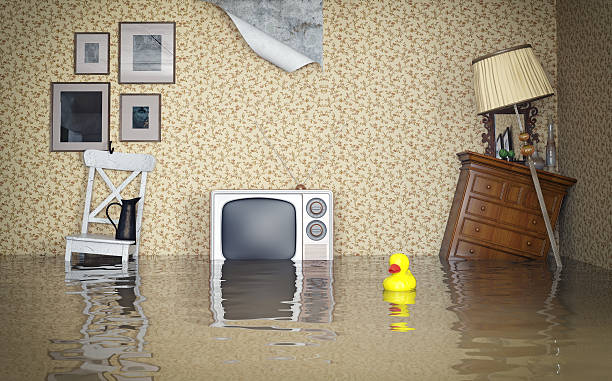Flood insurance is usually offered as a separate insurance policy to protect your home’s structure and belongings from flood-related damage. However, there are some exceptions to some flood policies. For example, flooding is described as an overflow of water onto normally dry land. Therefore, flood insurance frequently excludes coverage for events like mudslides.
Read more as the next part of this article will shed more light on flood insurance and how it works.
What Is Flood Insurance?
A type of property insurance known as “flood insurance” provides coverage for losses incurred by water damage, particularly due to flooding. Heavy or persistent rain, melting snow, coastal storm waves, clogged storm drainage systems, or levee dam failure are all potential flooding causes.
A flood is frequently regarded as a significant event, and if you do not have supplemental insurance, the harm or devastation it causes will not be covered. Property insurance that protects a home from flooding-related damages is called flood insurance.
All residential and business properties can purchase flood insurance. In addition, homeowners in participating communities can purchase flood insurance through the government National Flood Insurance Program (NFIP), which private insurers administer.
In addition to the property’s age, height, and number of floors, the cost of flood insurance is determined by the NFIP-designated flood zone in which the property is situated.
The average cost of flood insurance per year is $700, but prices differ depending on the location, the kind and size of the building, and other elements.
Benefits of Flood Insurance
- The calmness of mind: Your peace of mind will be one of the biggest advantages of buying commercial flood insurance. Unexpected issues can still result in flooding even if you don’t reside in a susceptible region. You can rest easy knowing that your company will be protected, that you won’t lose any of your products, and that you can recover from a natural catastrophe if you have this insurance!
- Defends Against Economic Destruction: You might not be able to recover monetarily if your company floods and you don’t have commercial flood insurance. Flood damage costs thousands of dollars to fix and can also harm the goods you offer or crucial business documents! The time your company is disrupted may result in additional financial loss. You are missing out on more money from your customers if you cannot work until repairs are made. If your company experiences flooding, commercial flood insurance protects your finances.
- Protects Building and Merchandise: As was previously stated, flood insurance covers more than just your building. Your insurance will safeguard you and pay for these expenses if a storm damages your valuable goods, papers, or other possessions.
- Extra Protection: The last advantage of commercial flood insurance is that it gives your company extra protection that other plans might not. Business owner policies may cover flooding from natural causes, but they won’t cover harm to your structure caused by broken pipes. Getting this extra protection will keep your company secure!
- Flood insurance is inexpensive: Through the NFIP, flood insurance is frequently very reasonably priced. Nevertheless, private flood insurance providers also provide competitive prices. Over 20% of flood claims are not made in high-risk locations. Mother Nature is erratic, and flood plains can shift. Properties in low- to moderate-risk areas are not completely free from danger. Over 200,000 homes were damaged, and $125 billion was incurred due to Hurricane Harvey’s 2017 impact on Houston. 80% of the homes and companies impacted by the storm were not near a 100-year flood plain. Almost all of these property owners lacked flood protection.
You can read more on Home Insurance Guide
Types of Flood Insurance
1. National Flood Insurance Program (NFIP)

Homeowners can obtain flood insurance funded by the federal government through the National Flood Insurance Program.
Any homeowner can purchase NFIP insurance, independent of flood risk, which provides up to $250,000 in building coverage and $100,000 in contents coverage.
If you own a business, you can buy an NFIP commercial policy with building and contents coverage of up to $500,000 each. However, these coverage tiers typically have different deductibles and may need to be bought individually for residential and commercial flood policies.
Through the NFIP initiative known as write your own (WYO) policy, flood policies may be issued either directly by the NFIP or by different insurance providers. As part of the WYO scheme, the insurance provider issues and maintains the policy. However, payment of any authorized claims pertaining to the insurance is the responsibility of the NFIP.
2. Private Flood Insurance

Private flood insurance protects your home’s structure and contents from flood damage, but the federal government does not subsidize this coverage. On the other hand, private flood insurers are businesses that use premium revenue or a reinsurance company to cover losses.
Compared to NFIP policies, private flood insurance policies can be more comprehensive, and you may have access to higher policy limits and more coverage options. Furthermore, waiting periods for private flood insurance may be shorter than the NFIP’s 30-day requirement.
How You Can Get Flood Insurance?
When it comes to purchasing flood insurance, you have many options. For example, you can purchase flood insurance from the same business that provides your homeowners or auto insurance because the NFIP collaborates with more than 50 insurers to market its policies.
To purchase NFIP insurance, you must reside in one of the more than 24,000 communities participating in the program.
Find commercial flood insurance providers if the NFIP is outside your region. Even if you have access to NFIP insurance, you can find a private insurer with more affordable prices. A nearby private agent can aid in your comparison shopping.
Only put off getting insurance once a storm is directly overhead your house. Typically, there is a waiting period between when you purchase flood insurance and when the policy kicks in. While waiting periods for other policies can be as brief as 10 to 14 days, the waiting period for NFIP policies is typically 30 days.
The lack of coverage for flood-related losses under standard homeowner, condo owner, or renters insurance plans may make having flood insurance advantageous. The National Flood Insurance Program (NFIP) and a few private insurance providers both offer flood insurance plans.
Your coverage does not become effective right away after you purchase flood insurance.
Before you can submit a claim, you usually have to wait 30 days. This period, however, might be exempted in a few circumstances, such as when you require flood insurance to close on or refinance a property or when your house has been included in a recently designated flood zone within a specific time frame.
If your elevation certificate can help lower your rate, please provide it to your insurer. The insurer will use an elevation certificate to assess your home’s flood risk because it contains the lowest elevation information.
A land surveyor or engineer can finish one for you, or you can request an elevation certificate from your neighborhood floodplain manager.
In contrast to the 30-day waiting period for NFIP plans, policies for private flood insurance can frequently be triggered in 10 days or less. However, if a storm or other significant weather event is forecast, private carriers might implement a moratorium. Getting quotes from a few private flood insurance carriers can help you compare prices and find the best flood insurance for your requirements, just like home insurance.
What Flood Insurance Covers
- building defense
- Your home’s foundation is covered by building coverage. It (is comparable to dwelling coverage on homeowners insurance). Indemnification for water damage includes:
- Devices for plumbing and electricity.
- Warmers for water.
- Furnaces.
- A foundation block.
- Cabinets and built-in equipment.
- Rugs that are permanently fixed.
- Independent facilities.
- Containers for water and fuel.
What Does Flood Insurance Not Provide Coverage For?
The exclusions in flood insurance policies are similar to those in house insurance policies.
One of these is:
- Potentially avoidable damage brought on by dampness, mildew, or mold
- the harm brought on by mudslides and other earth tremors
- Outdoor buildings such as decks, patios, pools, and landscaping are damaged.
- If your house has been damaged by flooding, additional living costs if you have to move elsewhere.
Since flood insurance is made to cover damage brought on by actual floods, internal causes of water damage, like broken pipes or malfunctioning sump pumps, are not covered by your policy. However, depending on your extra coverage, your house insurance policy may cover unforeseen and accidental water damage. This coverage types might need extra riders or endorsements.
What Businesses Should Get Commercial Flood Insurance
Anyone who runs a business ought to get flood insurance. This will safeguard your company in a flash flood, rising water, or other unforeseen catastrophes. Additionally, a lot of businesses are located in flood plains. This is a patch of low-lying land close to a waterway or other body of flowing water.
These fields are frequently inundated when the river rises. As a result, it’s possible that many businesses in these regions must carry flood insurance.
Many individuals think they are immune to flooding-related problems. Floods can occur anywhere, though. Find out if your company is close to a flood zone and assess your danger of flood damage.
How Flood Insurance Works
Flood insurance is a type of catastrophe insurance distinct from a homeowners insurance policy’s basic hazard insurance coverage. For all residential and commercial properties, flood insurance is available.
Water damage inside a home that results from storms or burst pipes is typically covered by homeowners insurance. In most cases, though, it excludes flooding-related destruction or damage. Therefore, in most cases, homeowners who reside in flood-prone areas need to obtain specialized insurance.
In terms of how it functions, flood insurance is similar to other insurance. According to the flood risk of the property and the deductible, the insured (the owner) pays an annual premium.
Check out Car Insurance Guide
Flood Insurance Conclusion
The cost of repairing flood-damaged property can be covered by flood insurance, eliminating the need to use up assets, incur debt, or wait for infrequently timely and inadequate federal assistance.
Flood Insurance Frequently Asked Questions
Do you need flood insurance?
Water damage and leaks caused by plumbing may be covered by homeowner’s insurance, condo insurance, and renters insurance plans, but losses from naturally occurring floods are not. This is because flooding frequently causes extensive damage throughout an area, which can result in hundreds or more significant claims at once.
Many private insurance firms need to be set up to handle the financial burden of paying out claims in amounts this high. Insurance companies would need to raise home insurance premiums substantially to guarantee their ability to cover flood damage claims. Instead, separate flood insurance coverage must be bought.
What level of flood insurance do I require?
Flooding can be extremely damaging, so consider insuring your house up to its replacement worth to help safeguard your finances from paying for repairs out of pocket. Although you can decline personal property coverage, doing so might not be the best move for you. If you purchase contents coverage, repairing or replacing your possessions after a flood is damaged will be covered.
The $250,000 property limit for NFIP policies should be noted, as some homeowners may not have enough replacement coverage. Consider reviewing your requirements with an insurance agent who can guide you if you are unsure how much coverage to purchase.
Do flooded basements qualify for flood insurance?
Your policy’s specifics and what triggered the flooding will determine the answer. For example, flood insurance wouldn’t pay out if your cellar flooded due to a sump pump malfunction, but your home insurance might if you have a water backup endorsement. In a new building in high-risk areas, the NFIP forbids and excludes basements. It would be best to speak with your agent and closely read your policy to decide on coverage because basements are more likely to sustain severe flood damage.
How can I claim flood insurance?
You should contact your insurance company as soon as possible to submit a claim if a natural flood damages your home or other personal property. Immediately following the submission of the claim, an assessor will be given the case. The claim adjuster will likely come to your house to assess the harm and decide what repairs are required. The adjuster will then determine your insurance payout.
If you have a mortgage, the cost of repairs to your home will be paid for by check to your lender; however, you will be reimbursed for replacing your personal belongings. It could take a month (or longer) to obtain your claim settlement, depending on your claim and your insurance provider.
